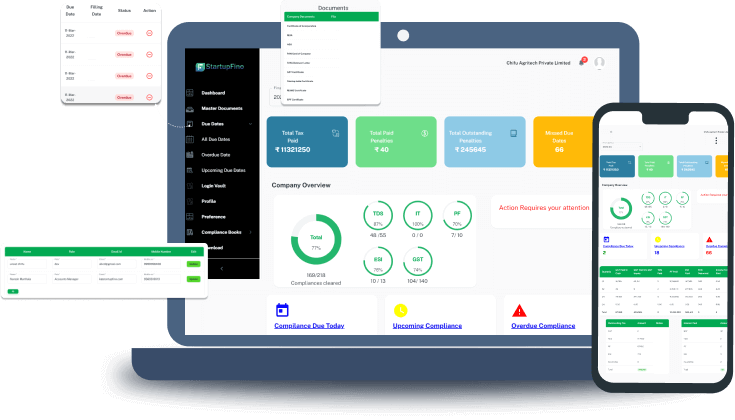Governed by the state government and falling under the purview of the labour department, the Shops and Establishments Act applies to all premises where services are provided to customers. This Act includes various commercial spaces, including offices, warehouses, stores, and more. Shop Act Compliance with the regulations and terms outlined in the Act is mandatory for these establishments in India. It ensures that businesses operate in accordance with the specified standards and contribute to maintaining a fair and secure working environment.
Benefits of Shop Act Compliance Services
Given below are the major points of importance of Shop and Establishment Act Compliances:
1. Legal Compliance:
Businesses bear the responsibility of adhering to a no. of laws and regulations. Shop Act Compliance Services assume a vital role in aiding organisations to meet their legal obligations.
2. Avoiding Penalties and Fines:
Shop and Establishment Act Compliance services assist organisations in steering clear of the penalties by ensuring strict adherence to relevant regulations, thereby safeguarding financial resources.
3. Protecting Reputation:
Non-compliance can tarnish an organisation's reputation, eroding trust among stakeholders. Shop and Establishment Act Compliance services actively contribute to protecting a business's reputation by identifying potential compliance gaps and implementing measures to rectify them, promoting transparency and reliability.
4. Mitigating Risk:
Shop Act Compliance Services specialise in identifying and assessing compliance risks that organisations may face. By addressing these risks and implementing preventive measures, businesses can mitigate the potential legal, financial, and operational consequences associated with non-compliance.
5. Ensuring Quality:
Adhering to industry standards is vital for upholding the quality of products and services. Shop and Establishment Act Compliance Services play a major role in aligning business practices with industry standards.
Significance of Statutory Shop Act Compliances in Business Operations
Ensuring statutory compliance is integral for the smooth functioning and reputation of a company. The following factors highlight the importance of adhering to statutory regulations:
1. Equal Treatment for Employees:
Statutory compliance promotes equal treatment for all employees. Laws and rules outlined in compliance checklists help prevent disparities in working hours and wages, promoting a fair and transparent work environment.
2. Guidelines for Tax Payments:
Compliance ensures clear guidelines for timely tax payments. This benefits both taxpayers, who can fulfil their obligations promptly, and tax collectors, who can efficiently collect due taxes within the stipulated timeframe.
3. Customer Loyalty:
Statutory compliance directly impacts customer loyalty. Organisations with a robust compliance structure are more likely to instil confidence in customers, whereas poor compliance may deter potential clients from engaging with the company.
4. Prevention of Financial Losses:
Non-compliance leads to penalties and fines, resulting in financial losses for the organisation. The imposition of such penalties can disrupt cash flow significantly, underscoring the financial importance of maintaining statutory compliance.
Which Establishments are Covered under Shop Act Compliances?
In accordance with the Shop and Establishment Act, a no. of establishments engaged in the provision of products or services are obligated to register and adhere to labour law compliance and contract labour compliance. The following categories include some of the primary entities mandated to comply with these regulations:
1. Shops - Retail and Wholesale:
Stores involved in retail and wholesale activities are required to register and adhere to labour law compliance.
2. Office and Service Premises:
Any office or premises providing services to customers falls under the purview of the Shop and Establishment Act and must comply with labour laws.
3. Storages, Warehouses, and Rental Premises:
Entities engaged in storage, warehousing, or rental activities are obligated to register and follow labour law compliance.
4. Commercial Establishments:
All types of commercial establishments, irrespective of their nature, must ensure compliance with labour laws.
5. Business Workplaces:
Any workplace utilised for business purposes is subject to the Shop and Establishment Act and must meet labour law compliance requirements.
6. Eateries and Food Service Establishments:
Restaurants, eateries, and other places serving food and beverages are mandated to register and adhere to labour law compliance.
7. Hotels and Lodging Houses:
Hospitality establishments, including hotels and lodging houses, are obligated to comply with labour laws.
8. Recreation and Entertainment Services:
Entities providing recreation and entertainment services, such as movie houses or theatres, must register and adhere to labour law compliance.
Major Compliances Under the Shops Act
The Shops Act includes various important aspects of compliance aimed at regulating and ensuring the well-being of employees. The key compliance areas covered by this Act include:
1. Regulation of Working Hours and Conditions:
The Act regulates the working hours and conditions of employees to maintain fair labour practices.
2. Rights and Privileges of Employees:
It ensures the provision of necessary rights and privileges to employees while imposing obligations on both employers and employees.
3. Prohibition of Child Labour:
The Act explicitly prohibits the engagement of child labour in covered establishments.
4. Welfare Measures for Employees:
Focuses on employee welfare by addressing aspects such as working hours, payment of wages, leave policies, workplace hygiene, sanitary conditions, and precautions against potential risks.
5. Record Keeping:
Mandates the maintenance of records for all activities and accounts within the establishment.
6. Labour Law Compliance:
Ensures adherence to broader labour laws applicable to the covered establishments.
7. Communication of Changes to Inspector:
Requires communication to the Inspector regarding any changes in registration particulars or other relevant details.
8. Compliance with Working Hours and Holidays:
Ensures compliance with specified working hours, rest intervals, weekly holidays, and opening and closing hours.
9. Maternity Benefit and Bonus Payment:
Verifies whether women entitled to maternity benefits have been paid bonuses promptly after childbirth.
10. Registration Certificate Amendments:
Checks if the registration certificate requires any amendment and ensures timely submission of the prescribed form to the inspector.
11. Safety and Hygiene Conditions:
Mandates the maintenance of proper safety and hygiene conditions, water supply, cleanliness, lighting, and ventilation within the establishment.
12. Filtered Water Storage:
Requires safe storage of sufficiently filtered water fit for human consumption in hygienic conditions.
13. Employee Medical Check-ups:
Mandates full-body medical check-ups for employees by certified medical professionals at least once a year, with records of examination reports.
14. Drainage and Emergency Exits:
Ensures provision for effective drainage and emergency exits in case of fire or disasters within the establishment.
Why Choose StartupFino for Shop Act Compliances?
StartupFino is a company that specialises in offering complete services on Shop Act compliances. We can help you with everything from providing advice in the initial phase to ensuring that you meet all the necessary requirements and compliances for your relevant industry.
Shop Act Compliance Services play an important role for businesses as these services are essential for mitigating risks, maintaining a positive reputation, and ensuring adherence to legal and quality standards. Statutory compliance is not merely a legal obligation but a strategic imperative for businesses to maintain employee relations and customer trust.







